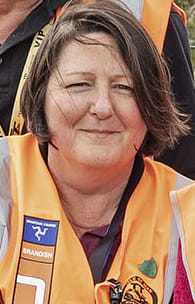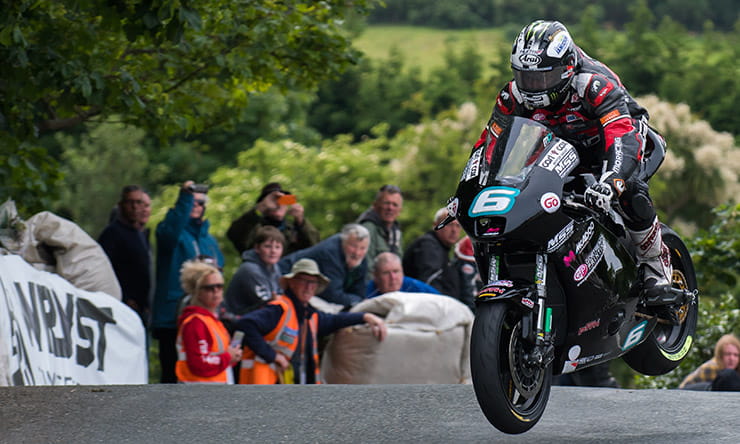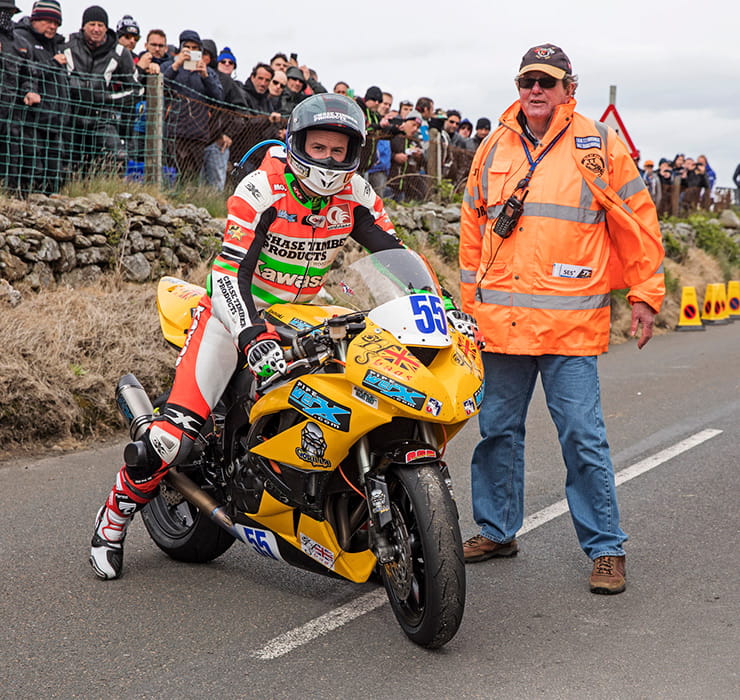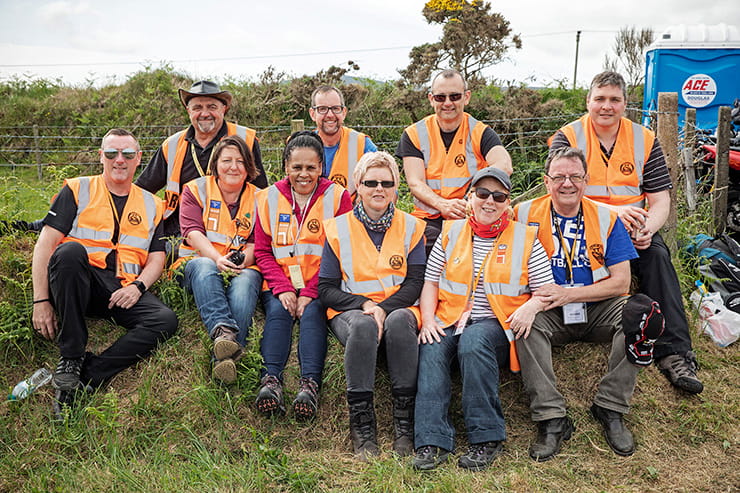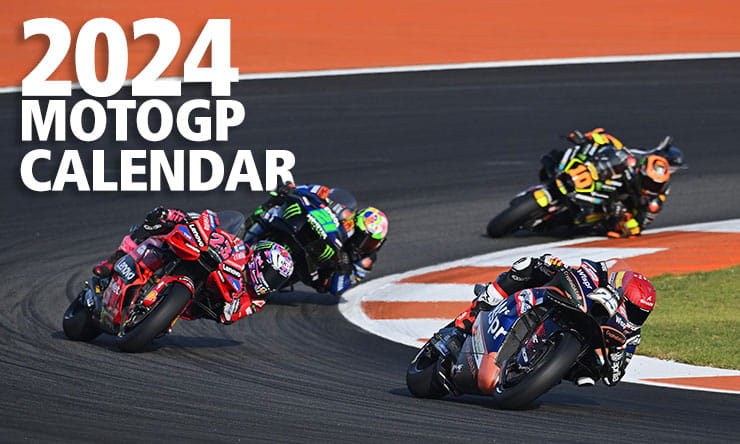Marshals watch on as Michael Dunlop jumps Ballaugh Bridge
Given that the famous Isle of Man TT Mountain Course is 37.73 miles long, has more than 200 corners and runs through both villages and mountain moorland, you’ll not be surprised to learn that more than 530 marshals are required, for every single practice and race session, before a wheel on a race bike can even turn towards the legendary Bray Hill.
And, as well as the internationally famous 111-year old TT, the course is also used for the slightly lesser-well known, but just as much fun, Isle of Man Festival of Motorcycling. Held every August, the fortnight-long Festival features the Bennetts sponsored Classic TT and the Manx Grand Prix.
It’s no surprise then that the IOM TT Marshals’ Association is always keen to welcome new marshals to join its skilled, dedicated team of men and women who play a key role in keeping the riders safe and making these world-renowned events happen for four weeks every year.
These dedicated souls clad in sturdy boots and orange high vis are the eyes and ears of the Clerk of the Course. Stood at regular intervals in line of sight around 37.73 miles of tarmac, their job is to ensure the roads are safe to race and the riders are looked after should they break down or have an accident. Observation and communication are key as the use of flags is the most effective way to communicate imminent danger, of a broken-down bike or oil on the road, directly to the riders - there’s no pit-to-bike comms here!
All new marshals are required to watch an introductory film before being teamed up with an experienced crew to watch and listen as they learn the ropes. They are never left on their own and will always have a senior marshal nearby to offer help and advice. Once sufficiently experienced out on the course there’s an opportunity for a one-day training course with more detailed information about flags and radio systems.
After a rider runs-on, a marshal guides him back to the circuit
Each fortnight-long event consists of a minimum of six evening practice sessions followed by four race days. It’s not mandatory for each marshal to be on duty for every session meaning there’s plenty of opportunities to spend a day to two at the Grandstand or spectating elsewhere on the course. However, every session they can cover really does help support the event.
All marshals need to be signed-on for every event to ensure legal permission to marshal. The powers are similar to a Special Constable, and are covered by ACU insurance while on duty. The first port of call is the TT Marshals’ Association office at the TT Grandstand to collect a warrant card and orange high vis tabard. We also provide a basic training information booklet and our knowledgeable team can answer any questions and provide directions to the marshal point.
A typical practice session or race day begins by arriving at the pre-arranged marshalling point at least 30 minutes before the roads close for a briefing by the senior marshal, usually the Deputy Sector Marshal (DSM). The DSM will allocate jobs depending on experience and preference such as flags and radio comms. This is followed by help with ensuring the roads are closed to traffic, putting up a barrier or a sign, and then completing a road walk to ensure any debris or discarded rubbish is removed, all gates are closed, and the road surface is in good condition.
During the racing, one of the most important skills is observation: checking the bikes and riders to ensure nothing is leaking from the machine and nothing is hanging off the bike or the rider’s leathers. That, and communication: reporting information back to race control and reacting to directions from race control.
The Brandish-based marshal team
Incidents do happen, of course, from bike fires to injured riders, and our well-drilled teams are always ready to react, supported by a group of highly-skilled Travelling Marshals, strategically placed paramedics and - call the cavalry - our dedicated teams in AirMed helicopters. Support is always available, and the skills learnt from other marshals, and from the training course, can also be very useful in everyday situations, reacting to incidents at work, in the home and on open roads.
Marshals descend on the island every year from all around the world, including Canada, US, New Zealand, India, South Africa and Europe, as well as from houses that border the course. Everybody is made very welcome and their work is appreciated by the organisers, teams and of course the riders.
The camaraderie of the marshaling team is brilliant. Spending the day with a bunch of likeminded people and watching thrilling road racing just metres away. Oh, and there’s always plenty of tea and cake! Life-long friendships have been formed downing a pint or two with fellow marshals after the racing has finished and some marshals have even met their future partners on the course! In 2017, a marshal proposed to his future wife course-side at Creg ny Baa, while they were both wearing their marshaling high viz orange tabards!
Marshals see the racing from a different perspective and it’s a great way to show support for the brave and skilled riders who compete around the famous TT Mountain Course, from the most decorated racers in the big teams setting sizzling laps record speeds of 135mph, to the newcomers who are taking on this amazing course for the very first time.
For more about marshaling click here: http://www.iomttma.com/index.php/2018/05/17/love-tt-join-us/
To join our team, register your details here and we’ll get right back to you: http://www.iomttma.com/oservices/index.php
Got questions? Then head to either https://facebook.com/IOMTTmarshals or call 01624 618191
PHOTOS: Jonathan Cole
